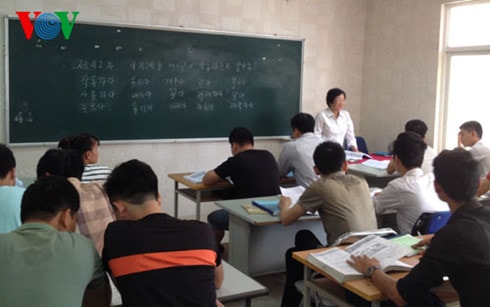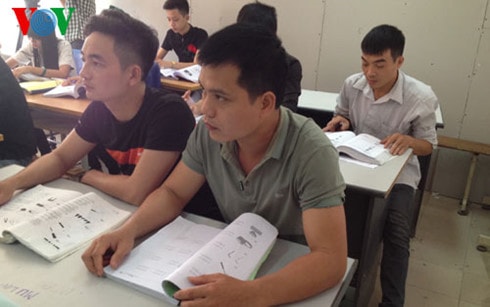Korean Language Test 1 vs 10
With the target of 2,100 workers going to Korea this time, while there are more than 21,600 people taking the exam, the ratio is 1 to 10, more difficult than the university entrance exam.
According to information from the Ministry of Labor, War Invalids and Social Affairs (MOLISA), after a 3-year hiatus, on October 8 and 9, the 11th Korean language test for workers going to work in Korea under the Employment Permit System (EPS) in the manufacturing industry will be held. This test is organized by the MOLISA in coordination with the Human Resources Development Service of Korea (HRD Korea).
 |
| Students are studying Korean at the Hanoi Employment Service Center. |
More difficult than university entrance exam
The exam was held in Hanoi, Vinh (Nghe An) and Ho Chi Minh City. This is the first exam after Vietnam and Korea re-signed the normal Memorandum of Understanding on sending and receiving Vietnamese workers under the EPS program in May 2016.
With a target of 2,100 workers, while there are more than 21,600 people participating in the exam, the ratio is 1 to 10. Candidates will take the test in the form of multiple choice, including two parts: reading comprehension and listening comprehension, each part has 25 questions. Each correct answer is worth 4 points. The maximum total score for the exam is 200.
Present at the Hanoi Employment Service Center (under the Hanoi Department of Labor, Invalids and Social Affairs) these days, the reporter noticed a very serious and urgent learning atmosphere of the workers to prepare for the upcoming exam here.
Mr. Nguyen Toan Phong, Director of Hanoi Employment Service Center, said that in 2016, after the Vietnamese and Korean Governments re-signed the EPS Program, in August, Hanoi received registrations for Vietnamese workers wishing to work in Korea. Accordingly, there were over 1,200 people registered. Compared to previous years (about over 4,000), this number is much lower.
The reason is that the program's implementation time was interrupted, some localities in Hanoi were suspended due to the high number of workers fleeing from Korea; meanwhile, workers have other options such as in markets outside Korea, including the domestic labor market...
According to Mr. Nguyen Toan Phong, with the Hanoi Employment Service Center, the Korean language training course for workers takes place within 3 months. During this time, there is also a review class for workers who have been trained in Korean in previous years and wish to return. The center strives to improve the quality of teaching and provide maximum support for workers so that they have the most solid knowledge to pass the exam.
However, Mr. Nguyen Toan Phong also said that there were many shortcomings in the recruitment registration this time. That is because of the short time, many workers registered and studied at the same time, in a rush to try to get on the list of Korean language test. They had to be very determined in such a limited study time. Many workers wondered if with such study time, they would have enough knowledge to pass this exam or not, while the "competition" rate was very high (10 people choose 1).
According to the Overseas Labor Center (Ministry of Labor, Invalids and Social Affairs), the number of 2,100 workers participating in the recruitment exam will be selected based on the principle of taking scores from high to low, among those who scored 80/200 points or more. The above figure is a provisional target for the first 6 months of 2017. If the rate of Vietnamese workers residing illegally in Korea decreases, the Korean side will consider increasing the quota for receiving workers in 2017.
Korea is a labor market with a good income, from 1,000 to 1,500 USD per month. Income can be higher if the worker is diligent. Since 2013, the high rate of runaway workers has caused about 35,000 - 40,000 Vietnamese people to lose the opportunity to work in Korea. Accordingly, the Korean side has requested the Ministry of Labor, Invalids and Social Affairs to temporarily suspend labor in 2016 for 44 districts, towns and cities with the number of illegal residents in Korea at a rate of 35% and 60 people or more.
 |
| Many students are worried because the "competition" rate is quite high. |
Will there be any cheating in the exam?
Responding to a reporter's question about whether there is any negativity in the upcoming Korean language exam, Deputy Minister of Labor, Invalids and Social Affairs Doan Mau Diep affirmed: The Ministry of Labor, Invalids and Social Affairs has warned on the mass media about the situation of brokers every time Korean language exams take place.
According to Deputy Minister Doan Mau Diep, the Korean language test is organized by the Human Resources Development Service of Korea (HRD Korea); the test questions (written test, audio tape) are all made by the Korean side; HRD Korea also organizes the grading. During the test, the control is very strict. This year, it is possible to disrupt the phone signal in the test area and no one can interfere with the test and grading process, including from the Ministry of Labor, Invalids and Social Affairs.
“The selected examiners do not know Korean, so they cannot “play” the cards. Workers should not believe any “bait”, introduction, or protection. No one can interfere. We have warned about this” – Deputy Minister Doan Mau Diep said. Mr. Doan Mau Diep also shared that with such a large “competition” rate, more difficult than the university entrance exam, workers should consider and can participate in other very good programs such as going to Japan and Taiwan.
Regarding the support policy for workers returning from Korea, in response to information reflecting that returning workers have occupations that are not suitable for the domestic market, making it difficult to find jobs. Deputy Minister Doan Mau Diep emphasized that workers participating in the EPS program mainly work in small and medium-sized enterprises, which do not require high quality, only need to finish grade 12, pass the Korean language test and have some skills. Therefore, jobs in Korea may be different from jobs in Vietnam.
There are currently many solutions to support Korean workers returning home, such as organizing many job exchanges, inviting Korean businesses to interview and select workers. Of course, it is impossible to hope to support 100% of workers returning from Korea to find jobs, because workers have many choices, can open their own production and business establishments, or they want to find jobs that match their skills and income./.
According to VOV
